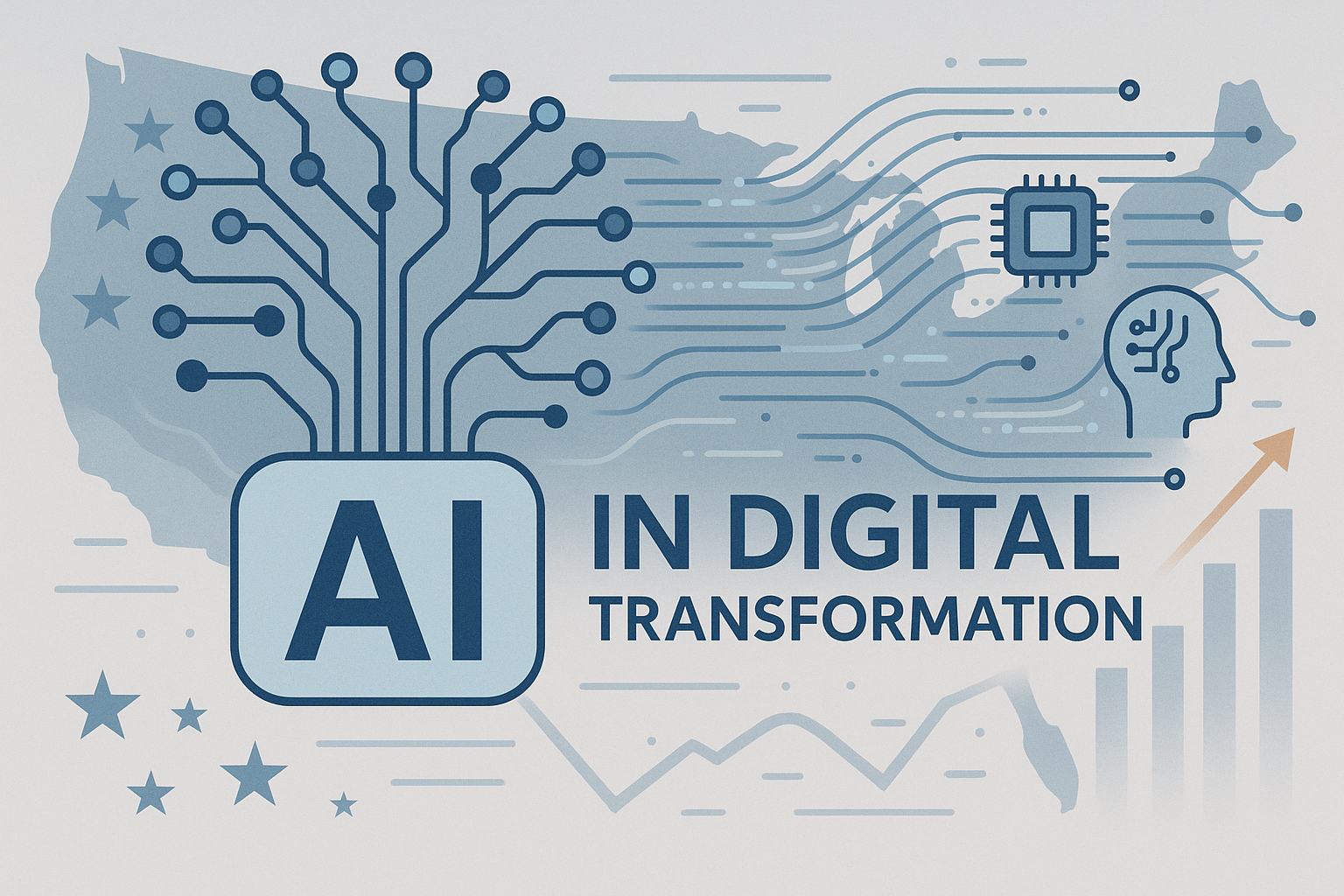
AI in Digital Transformation: How Artificial Intelligence is Revolutionizing U.S. Businesses in 2025
Introduction to AI in Digital Transformation
Artificial Intelligence (AI) is no longer a futuristic concept—it’s a driving force behind digital transformation across U.S. industries in 2025. From healthcare and finance to retail and manufacturing, AI is reshaping how organizations operate, innovate, and deliver value to customers. This comprehensive guide explores the pivotal role of AI in digital transformation, the top use cases, benefits, challenges, and best practices for U.S. businesses aiming to stay ahead in the digital era.
What is AI in Digital Transformation?
AI in digital transformation refers to the integration of artificial intelligence technologies—such as machine learning, natural language processing, and computer vision—into business processes, products, and services. This integration enables organizations to automate tasks, gain actionable insights, personalize experiences, and drive innovation at scale.
TIP: Embracing AI is not just about technology—it’s about reimagining business models, workflows, and customer engagement for the digital age. 🚀
Why AI is Essential for Digital Transformation in 2025
Key Benefits of AI in Digital Transformation
- Enhanced Efficiency: Automate repetitive tasks and streamline operations.
- Data-Driven Decisions: Leverage predictive analytics for smarter strategies.
- Personalized Customer Experiences: Tailor offerings to individual preferences.
- Innovation Acceleration: Rapidly develop new products and services.
- Competitive Advantage: Stay ahead in a fast-evolving digital landscape.
U.S. Market Trends
According to the latest 2025 data, over 70% of U.S. enterprises have adopted AI-powered solutions as a core part of their digital transformation strategy. This widespread adoption is fueled by the need to improve agility, reduce costs, and meet rising customer expectations.
Top 10 Use Cases of AI in Digital Transformation for U.S. Businesses
AI is transforming every sector. Here are the top 10 use cases leading the charge in 2025:
- Customer Service Automation (Chatbots & Virtual Assistants)
- Predictive Analytics for Business Intelligence
- Personalized Marketing Campaigns
- Fraud Detection and Risk Management
- Supply Chain Optimization
- Healthcare Diagnostics and Patient Care
- Smart Manufacturing (Industry 4.0)
- Financial Forecasting and Planning
- Human Resources Automation
- Cybersecurity Threat Detection
Side-by-Side Comparison Table
| Rank | AI Use Case | Industry Impacted | Key Benefit |
|---|---|---|---|
| 1 | Customer Service Automation | Retail, Banking | 24/7 support, cost savings |
| 2 | Predictive Analytics | All | Better decisions |
| 3 | Personalized Marketing | E-commerce, Media | Higher engagement |
| 4 | Fraud Detection | Finance, Insurance | Reduced losses |
| 5 | Supply Chain Optimization | Manufacturing, Retail | Efficiency, cost control |
| 6 | Healthcare Diagnostics | Healthcare | Improved outcomes |
| 7 | Smart Manufacturing | Manufacturing | Productivity, quality |
| 8 | Financial Forecasting | Finance | Accurate planning |
| 9 | HR Automation | All | Faster hiring, retention |
| 10 | Cybersecurity Threat Detection | All | Enhanced protection |
How AI Powers Digital Transformation: Real-World Examples
1. AI-Driven Customer Service
AI chatbots and virtual assistants are now standard in U.S. retail and banking, providing instant, accurate responses to customer inquiries. This not only improves customer satisfaction but also reduces operational costs.
2. Predictive Analytics for Smarter Decisions
Businesses use AI to analyze massive datasets, forecast trends, and make proactive decisions. For example, retailers predict inventory needs, while healthcare providers anticipate patient surges.
3. Personalized Marketing
AI algorithms segment audiences and deliver tailored content, boosting conversion rates and customer loyalty. In 2025, U.S. e-commerce brands report a 30% increase in ROI from AI-powered campaigns.
4. AI in Healthcare
From diagnostic imaging to personalized treatment plans, AI is revolutionizing patient care. Hospitals leverage AI to detect diseases earlier and optimize resource allocation. 🏥
Challenges of Implementing AI in Digital Transformation
While the benefits are significant, U.S. organizations face several challenges:
- Data Privacy and Security: Ensuring compliance with regulations like HIPAA and CCPA.
- Talent Shortage: High demand for AI and data science professionals.
- Integration Complexity: Merging AI with legacy systems.
- Change Management: Overcoming resistance to new technologies.
- Ethical Considerations: Addressing bias and transparency in AI models.
TIP: Start with pilot projects and invest in employee training to ease the transition to AI-powered workflows. 📦
Best Practices for U.S. Businesses Adopting AI in Digital Transformation
1. Define Clear Objectives
Set measurable goals for AI initiatives aligned with business priorities.
2. Invest in Quality Data
AI thrives on data. Ensure your data is accurate, secure, and accessible.
3. Foster a Culture of Innovation
Encourage experimentation and cross-functional collaboration.
4. Prioritize Ethical AI
Implement guidelines to ensure fairness, transparency, and accountability.
5. Partner with Experts
Collaborate with AI vendors, consultants, or academic institutions to bridge skill gaps.
The Future of AI in Digital Transformation: What to Expect in 2025 and Beyond
AI will continue to evolve, with advancements in generative AI, autonomous systems, and edge computing. U.S. businesses that embrace AI-driven digital transformation will unlock new revenue streams, improve resilience, and deliver superior customer experiences.
TIP: Stay agile and continuously monitor AI trends to maintain a competitive edge. ✅
Conclusion
AI in digital transformation is reshaping the U.S. business landscape in 2025. By integrating AI technologies, organizations can automate processes, gain actionable insights, and deliver personalized experiences that drive growth and innovation. While challenges like data privacy, talent shortages, and ethical concerns exist, adopting best practices and fostering a culture of innovation can help businesses overcome these hurdles. As AI continues to advance, those who embrace its potential will lead the way in the digital era—transforming not just their operations, but the very nature of their industries.